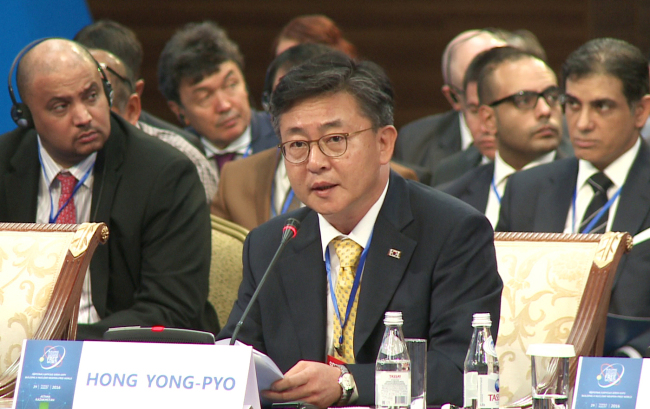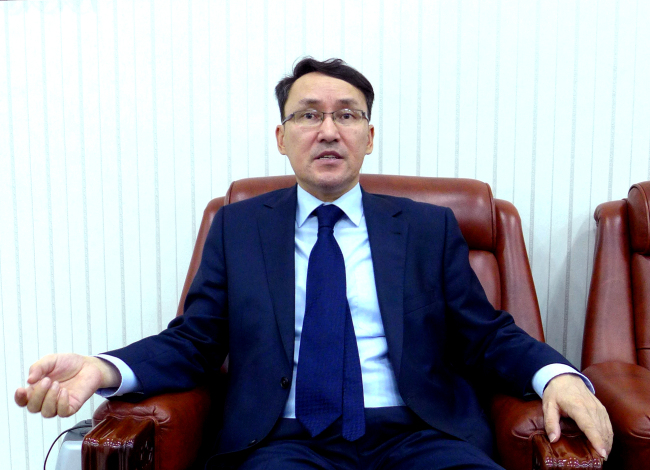On Aug. 29 1991, Kazakhstan voluntarily renounced its military nuclear capacity by closing down the Semipalatinsk test site, a primary experiment ground for the Soviet Union’s atomic weapons.
By terminating the world’s fourth-largest atomic arsenal of more than 1,400 nuclear warheads at the time, the Central Asian nation was embarking on a path of disarmament and peace as a responsible member of the international community.
Marking the 25th anniversary of the event, Astana held a two-day forum titled “Building a Nuclear Weapon-Free World” last week. It brought together over 40 high-ranking government officials, diplomats, mayors, experts, scholars and nongovernment representatives from around the world.
South Korean Minister of Unification Hong Yong-pyo attended the event, and spoke of North Korea’s nuclear development program, urging the communist regime to follow Kazakhstan’s course.
 |
South Korean Minister of Unification Hong Yong-pyo speaks at a forum titled “Building a Nuclear Weapon-Free World” in Astana, Kazakhstan last Monday, organized to mark the 25th anniversary of the decommissioning of the Semipalatinsk nuclear test site. (Ministry of Unification) |
“The decision of Kazakh President Nursultan Nazarbayev to close down the nuclear test site at Semipalatinsk was a historic step for peace and human dignity against the threat of nuclear weapons,” Hong said in a speech.
“Kazakhstan voluntarily removed its nuclear weapons and it was a right choice. As a result, the country is now enjoying the trust of foreign partners and attracting large investments. It has grown into an economic powerhouse in Central Asia.”
The erstwhile Soviet Union conducted 456 nuclear tests at Semipalatinsk from 1949 until 1989. The full impact of radiation exposure was kept secret for many years by the Soviet authorities, and was only brought to light after the test site was decommissioned.
Commemorating the milestone event, the 64th session of the United Nations General Assembly on Dec. 2, 2009 unanimously adopted resolution 64/35, which launched the International Day against Nuclear Tests to be observed annually on Aug. 29.
Highlighting Pyongyang’s proliferating nuclear program -- the only country to have conducted four atomic tests in the 21st century with the threat of more to come -- Hong expressed concerns over the impact on environment and people living in areas near the test site in North Korea, called Punggyeri.
Referring to a survey of defectors from the region, he said the area’s residents suffered from cancer, heart diseases, sensory disorders and paralyzed legs.
“North Korea’s nuclear development must be stopped,” he stressed. “The Pyongyang regime must realize that it is threatening the life of Korean people and ruining the land where our children have the right to enjoy a bright future.”
Seoul aspires for a unified Korean Peninsula that will contribute to a nuclear-free and peaceful world, the minister added.
 |
Kazakh Ambassador to Korea Dulat Bakishev (Joel Lee / The Korea Herald) |
In an interview with The Korea Herald last week, Kazakh Ambassador to Korea Dulat Bakishev underlined that nuclear disarmament and nonproliferation are Astana’s main foreign policy priorities.
“Kazakhstan consistently stands for nuclear disarmament and strict adherence to the principles of nonproliferation of weapons of mass destruction, alongside the inalienable right of states to their peaceful use of nuclear energy,” he noted.
“We express deep concern that while the nonnuclear weapons states have generally fulfilled their commitments under the Treaty on the Nonproliferation of Nuclear Weapons, also known as the Nonproliferation Treaty, nuclear weapons states have not taken decisive actions to get rid of their atomic arsenals.”
Adding that the indefinite extension of the NPT should not serve as basis for delaying the reduction of nuclear arsenals, the ambassador said his government has urged other states to make a further cut of their atomic weapons toward full elimination.
At the first Nuclear Security Summit in Washington D.C. in April 2010 and the 70th session of the United Nations General Assembly in New York in September last year, Nazarbayev proposed concrete measures for nuclear disarmament.
The president’s proposal included the total elimination of nuclear weapons as the only absolute guarantee of peace; the adoption of a worldwide multilateral and legally binding document to guide the abolishment of atomic arsenals; the redirection of investment into the sustainable development of communities, economies and the environment; and worldwide compliance with international humanitarian laws and norms.
“In the 21st century, humanity must take decisive steps toward demilitarization,” Nazarbayev said in Washington in March. “We won’t get another chance. If this objective is not achieved, our planet will end up a graveyard of radioactive materials.”
Lauding the adoption of the Joint Comprehensive Plan of Actions on Iran’s nuclear program in Vienna in July last year, Bakishev claimed the deal’s effective implementation serves as a model of strengthening global nonproliferation and regional security.
The envoy also offered words of admonishment for Pyongyang, counselling the regime to abandon its nuclear ambitions and return to the six-party talks negotiations involving the US, China, Russia, South Korea and Japan.
“As a co-chair of the ninth article of the 14th Conference of the Comprehensive Nuclear Test Ban Treaty (CTBT), Kazakhstan believes the actions of North Korea seriously undermine the international community’s efforts toward nuclear disarmament and nonproliferation, as well as strengthening of global security through the early entry into force of the CTBT,” the ambassador said.
“We are firmly convinced that the key to global security and sustainable development lies not in nuclear arsenals, but in mutually beneficial cooperation and international relations through negotiation.”
By Joel Lee (
joel@heraldcorp.com)









![[Today’s K-pop] Blackpink’s Jennie, Lisa invited to Coachella as solo acts](http://res.heraldm.com/phpwas/restmb_idxmake.php?idx=644&simg=/content/image/2024/11/21/20241121050099_0.jpg)